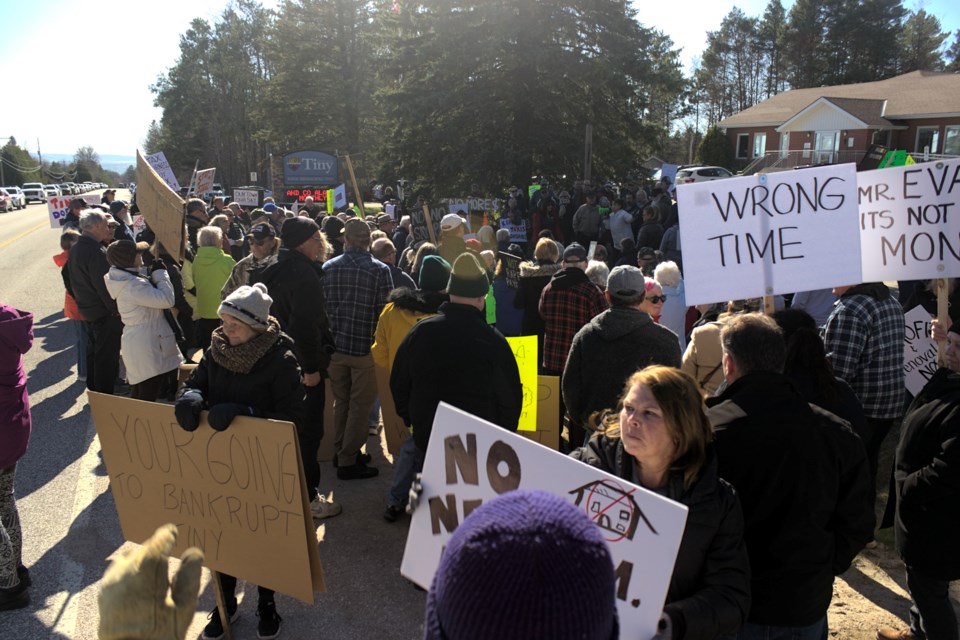If there’s a difference between proactive and reactive, it was shown at the protest against a new proposed municipal building in front of the current administration of Tiny Township.
Roughly 200 supporters of organizer Karen Zulynik joined outside the Balm Beach Road offices prior to Wednesday night’s council meeting and, unlike the January protest, it was clear there was preparation involved.
Police presence was contained to the safety of leading exiting staff onto the road. Protest music was kept to a background noise while the bullhorn allowed Zulynik to be joined by others to share their message.
Zulynik took the opportunity to remind attendees of the threat to taxes that the potential multi-million-dollar Tiny Township administration centre (TTAC) could cause for the average ratepayer, but as the crowd had gathered before 4:30 p.m. and with an hour to pad, Zulynik also reminded the crowd to not exhibit behaviour akin to bullying and to remain respectful inside council chambers. Other speakers also took to the bullhorn to share their concerns.
Council was in closed session at the time and did not allow for any representatives to meet with the crowd as 5:30 p.m. arrived and the maximum capacity of just over 55 people entered the basement of the 57-year-old building for the regular meeting to begin.
Open deputations limited to five minutes in length were provided to attendees with pre-scheduled deputations set for 6:30 p.m. However, seven speakers shared their thoughts with wide responses across all topics.
Drew Ironstone, who identified himself as a former Simcoe County employee and asset management specialist with two decades of experience, warned council on the potential costs above the listed price for a new facility, and asked for a pause.
Coun. Kelly Helowka simply asked, “When do we build it?" and was heckled by the crowd with responses.
Resident Dave Wolfe cautioned amalgamation as a threat that could happen if other municipalities perceived a weakened council; he provided a quote from Coun. Steffen Walma in his case and was cheered.
Walma immediately replied with the full quote and context to the disapproval of attendees, and countered that taking on the TTAC was a sign that the municipality was invested in its ratepayers and hadn’t abandoned them.
While the general consensus was against council, a deputation by Pam Fulford expressed disappointment over recent conflict of cyberbullying and a lack of respect between frustrated residents and the municipality, encouraging a return to civility. Her concerns were met with muted obscenities by some protesters in the gallery, and she received a less-than-hearty applause upon conclusion; several protesters left the chambers in anger, allowing those waiting outside to fill it back to capacity.
Naturalist Paul Bell shared concerns over species at risk, and Erik Schomann reiterated the momentum and amalgamation angles. For a scheduled deputation, Zulynik provided information on a remote-hybrid work policy while adding emphasis to not needing a new centre built.
The regular council meeting continued dutifully as council proceedings involved adopting minutes of previous meetings. It was at this point that Coun. Dave Brunelle chose to challenge the previous meeting’s decisions of council where his sole opposition to the TTAC could be reconsidered.
Brunelle began his hour-long challenge first by asking public works director Tim Leitch to define the word ‘antiquated’, as taken from eight years prior through a clerk’s summary on a report that wasn’t accessible; the manoeuvre caused other council members and staff to scramble in search of the reference.
Catching on to Brunelle’s obstruction with requests for revotes on all TTAC decisions of the previous meeting, Walma requested for recorded votes on the items where Brunelle was defeated 1-4 in all cases. Walma also proposed a motion for staff to explore finance options, which Brunelle admitted being “baffled” by as it superceded the usual three-week span for a council decision.
At the recess between regular council and committee of the whole when everyone mingled, protesters hugged Brunelle while expressing relief that he was the only one speaking for them. Helowka spoke with Wolfe over a point of contention, but the two shook hands in understanding and resolution.
The remainder of the meeting drew to conclusion with just Zulynik and one other in the audience before council entered another closed session. As Zulynik departed, she expressed tiredness from the emotionally-charged day having led up to the protest and lengthy council meetings.
Following the meeting, Evans spoke to Village Media on the protest and those in attendance of the meeting.
“I think it was very respectful,” said Evans. “I think it was very good night. Sure it’s a tough topic, an emotional topic. It’s something we’ve never done in this township ever, and it’s a substantial change. But I’m very proud of how everybody acted. Although a tough time, it shows the maturity and civility and professionalism of our township.”
In the meeting, attention was brought to Zulynik’s online petition which had remained at 2,200 signatures from the previous meeting; according to the 2021 Census, Tiny Township has a population of roughly 13,000 residents.
Said Evans: “It’s no secret that the majority, we feel, is somewhat silent; sometimes the minority position tends to be a little bit louder. This meeting has been similar to the meeting we had three weeks ago in terms of the sentiment overall.”
The TTAC update report from the previous meeting, including recommendations and schematics for proposed facility variations, can be viewed on the agenda page on the Township of Tiny website.



